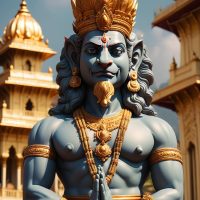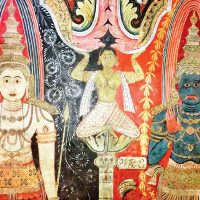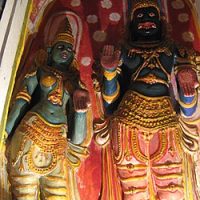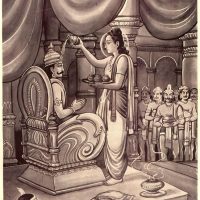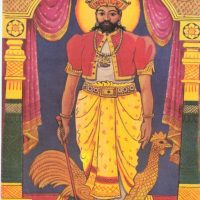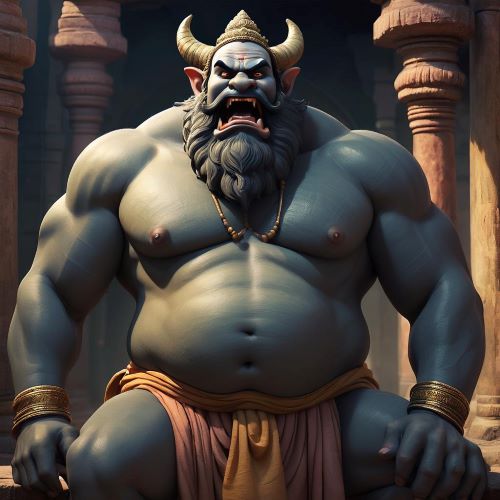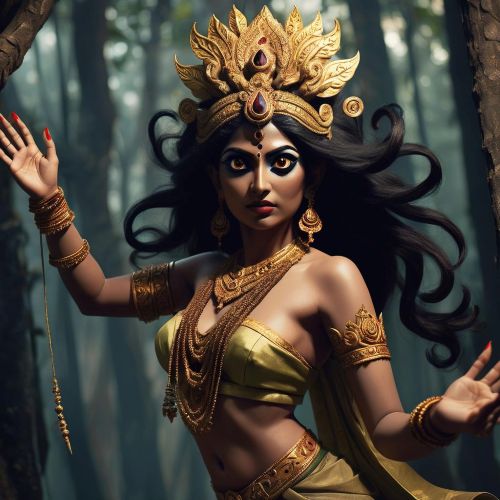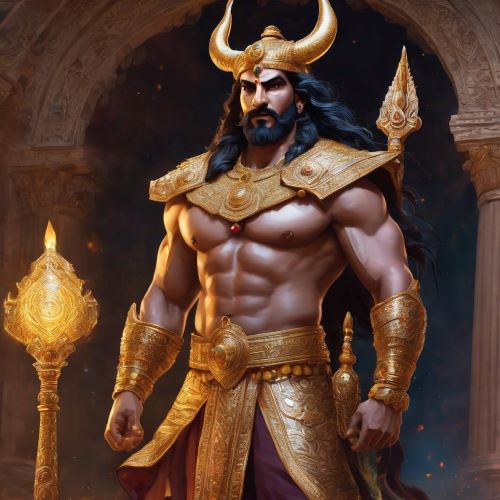Vibhishana : The Righteous Rakshasa
Listen
At a glance
| Description | |
|---|---|
| Origin | South Asian Mythology |
| Classification | Mortals |
| Family Members | Vishrava (Father), Kaikesi (Mother), Ravana, Kumbhakarna (Brothers), Shurpanakha (Sister) |
| Region | India, Sri Lanka |
| Associated With | Dharma, Royalty |
Vibhishana
Introduction
Vibhishana, the noble and righteous brother of Ravana, stands as one of the most fascinating characters in the Ramayana. Born into the demon (Rakshasa) lineage of Lanka, Vibhishana chose to walk the path of dharma, earning admiration across generations as a symbol of truth and virtue. His decision to abandon his brother Ravana and join Lord Rama in the battle against evil marks a defining moment in the epic—showing that righteousness must take precedence over blind loyalty. Even as a Rakshasa by birth, Vibhishana’s life embodied the ideals of morality, compassion, and wisdom. After Ravana’s downfall, Lord Rama crowned him the new King of Lanka, where he ruled with justice and piety. In Sri Lankan tradition, Vibhishana transcends mythology, revered as a guardian deity who protects the island and upholds balance. His story continues to inspire modern readers as a timeless reminder that true strength lies in moral courage and devotion to righteousness.
Physical Traits
Unlike most Rakshasas, who are depicted as fierce and terrifying, Vibhishana’s appearance reflected his inner purity and spiritual elevation. Descriptions in ancient texts portray him as tall, handsome, and radiant, with a serene expression that exuded calmness and wisdom. Though his Rakshasa heritage gave him certain physical features, such as pronounced teeth or a powerful frame. his demeanor remained peaceful and composed. Iconography across South India and Sri Lanka often shows Vibhishana adorned in royal attire, holding a staff or mace symbolizing leadership and authority. His gentle eyes and folded hands in devotional posture distinguish him from his more aggressive kin. This imagery reinforces the idea that Vibhishana’s true power came not from brute strength but from his unwavering faith, intellect, and commitment to dharma.
Family
Vibhishana was born to the sage Vishrava and the Rakshasi Kaikesi, making him the youngest brother of Ravana, Kumbhakarna, and Shoorpanakha. His lineage united both spiritual wisdom and demonic power, a duality that shaped his moral outlook. His half-brother was Kubera, the god of wealth, who once ruled Lanka before Ravana seized it. Despite growing up amid the grandeur and corruption of Ravana’s court, Vibhishana remained steadfast in his devotion to righteousness and Lord Vishnu. His wife, Sarama, shared his virtues and is remembered for her compassion, particularly toward Sita during her captivity. Their daughter, Trijata, also displayed remarkable empathy, comforting Sita and foretelling Rama’s victory. Together, this family represents the triumph of virtue over vice within the very heart of Lanka’s darkness.
Other names
Vibhishana is known by several names that reflect his divine qualities and moral stature. The name Vibhīṣaṇa in Sanskrit can be interpreted as “formidable” or “awe-inspiring,” though his life gives it a deeper spiritual meaning—one who inspires reverence through righteousness. After Ravana’s death, Rama bestowed upon him the title “King of Lanka,” recognizing his devotion and fairness. In Hindu mythology, Vibhishana is also counted among the Chiranjivis, the immortals who will live until the end of the current age, the Kali Yuga—symbolizing the eternal nature of truth. In Sri Lankan Buddhist tradition, he is worshipped as Vibhishana Deviyo, a guardian deity who protects the island and ensures justice. He is often referred to as the “Protector of the West,” one of the four guardian deities in the Sinhala pantheon.
Powers and Abilities
Vibhishana possessed both mystical and intellectual powers that set him apart from other Rakshasas. Through his devotion to Lord Vishnu, he attained immense spiritual insight and moral clarity. He had the ability to fly, change forms, and counter dark magic, skills that he used not for war or conquest but for guidance and protection. During the Ramayana war, his deep knowledge of Lanka’s fortifications and Ravana’s weaknesses proved essential in securing Rama’s victory. He revealed the secret of Ravana’s invincibility, demonstrating his loyalty to dharma over kinship. Brahma, pleased with Vibhishana’s penance and righteousness, granted him immortality and the blessing to always remain devoted to truth. His wisdom, restraint, and humility made him one of the most respected advisors in Rama’s camp. More than any physical or magical strength, Vibhishana’s greatest power was his unwavering adherence to righteousness, which made him a living embodiment of dharma itself.
Modern Day Influence
Vibhishana’s legacy continues to thrive across South Asia, particularly in India and Sri Lanka, where his story remains a symbol of moral integrity and ethical leadership. In Sri Lanka, Vibhishana is worshipped as a guardian deity at the Kelaniya Raja Maha Vihara, a revered temple near Colombo believed to be built on the site where he was crowned king by Lord Rama. Devotees pray to him for protection, justice, and inner peace. In India, especially in Tamil Nadu and Karnataka, his story is celebrated during Rama Navami and Dussehra festivals through Ramlila performances that dramatize his pivotal choice to stand with righteousness against his own family.
In modern culture, Vibhishana’s name has become synonymous with ethical dissent. His decision to defy Ravana’s tyranny is often used in political and philosophical discussions to represent integrity, whistleblowing, and moral resistance against corruption. Scholars and spiritual teachers cite Vibhishana as a model of ethical governance and personal virtue, reminding leaders to uphold justice even at personal cost.
In contemporary literature and cinema, reinterpretations of the Ramayana frequently explore Vibhishana’s moral struggle, presenting him as both a hero and a tragic figure torn between love and duty. His character’s complexity resonates in modern society, where individuals often face similar ethical dilemmas.
The continuing worship of Vibhishana in Sri Lankan Buddhist and Hindu traditions reflects the enduring harmony between the two cultures, with his figure serving as a bridge between India and Sri Lanka’s shared mythological heritage. As one of the few Rakshasas to be immortalized as a deity, Vibhishana embodies the message that true divinity arises not from birth or power, but from one’s steadfast commitment to righteousness.
Related Images
Source
Wikipedia. (2025). Vibhishana. Retrieved October 14, 2025, from https://en.wikipedia.org/wiki/Vibhishana
Wisdomlib.org. (2024, November 26). Vibhishana, Vibhīṣaṇa, Vibhīṣaṇā: 30 definitions. https://www.wisdomlib.org/definition/vibhishana
Gayatri Heritage. (2025, January 29). Vibhishana: The Immortal Devotee of Lord Rama. https://gayatriheritage.com/blogs/our-blogs/vibhishana-the-immortal-devotee-of-lord-rama
Vedadhara.com. (2024, February 16). Vibhishana in Ramayana – A Tale of Morality, Loyalty, and Redemption. https://www.vedadhara.com/vibhishana-in-ramayana-a-tale-of-morality-loyalty-and-redemption
Archaeology Ceylon. (2020, September 11). Vibhishana: Sri Lanka’s Rakshasa King of the Western Province. https://archaeologyceylon.weebly.com/home/vibhishana-sri-lankas-rakshasa-king-of-the-western-province
Padma, S. (2019). Borders Crossed: Vibhishana in the Ramayana and Beyond. South Asia: Journal of South Asian Studies, 42(3), 455-471. https://www.tandfonline.com/doi/abs/10.1080/00856401.2019.1631738
Drishti IAS. (2025, April 8). India-Sri Lanka Relations. https://www.drishtiias.com/daily-updates/daily-news-analysis/india-sri-lanka-relations-6
Philotreat.com. (2025, February 10). The Mythical Lives of Ravana, Kumbhakarana, and Vibhishana. https://philotreat.com/2025/02/10/the-mythical-lives-of-ravana-kumbhakarana-and-vibhishana/
Goldman, R. P. (2007). The Ramayana of Valmiki: An Epic of Ancient India. Princeton University Press.
Doniger, W. (2009). Hindu Myths: A Sourcebook Translated from the Sanskrit. Penguin Classics.
Narayan, R. K. (2006). The Ramayana: A Shortened Modern Prose Version of the Indian Epic. Penguin Books.
Bhattacharji, S. (1990). Legends of Devi. Orient Longman.
De Silva, K. M. (1981). A History of Sri Lanka. University of California Press.


